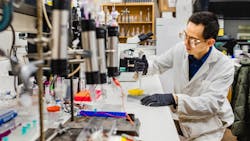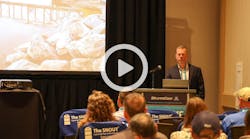Bacteria Discovered by Cornell Researchers Combats Soil Pollutants
ITHACA, NY — Researchers from Cornell University have found a new species of soil bacteria that is adept at breaking down organic matter, including the cancer-causing chemicals that are released when coal, gas, oil, and refuse are burned.
Dan Buckley, professor of microbial ecology and five other Cornell researchers, along with colleagues from Lycoming College, described the new bacterium in a paper published in the International Journal of Systematic and Evolutionary Microbiology.
The newly discovered bacteria, Paraburkholderia madseniana, is named in honor of the late Gene Madsen, the microbiology professor at Cornell who started the research but passed away in 2017 before the discovery was confirmed. The genus to which madseniana belongs is Paraburkholderia, known for their ability to degrade aromatic compounds (which are unusually stable and do not break apart easily) and, in some species, the capacity to form root nodules that fix atmospheric nitrogen.
Madsen's research focused on biodegradation and the role that microbes play in breaking down contaminants in soil, with a focus on the organic pollutants polycyclic aromatic hydrocarbons (PAHs) and providing natural tools to address hazardous waste in areas where soil cannot be easily removed.
Sequencing the bacterium's ribosomal RNA genes provided genetic evidence that madseniana was a unique species. In studying the new bacteria, the researchers noticed that madseniana is especially adept at breaking down aromatic hydrocarbons, which make up lignin, a major component of plant biomass and soil organic matter. Aromatic hydrocarbons are also found in toxic PAH pollution.
This means that the newly identified bacteria could be a candidate for biodegradation research and an important player in the soil carbon cycle.
In the case of madseniana, Buckley's lab wants to learn more about the symbiotic relationship between the bacteria and forest trees. Initial research suggests that trees feed carbon to the bacteria, and in turn, the bacteria degrade soil organic matter, thereby releasing nutrients such as nitrogen and phosphorus for the trees.
Understanding how bacteria break down carbon in soil could hold the key to the sustainability of soil and the ability to predict the future of global climate.


